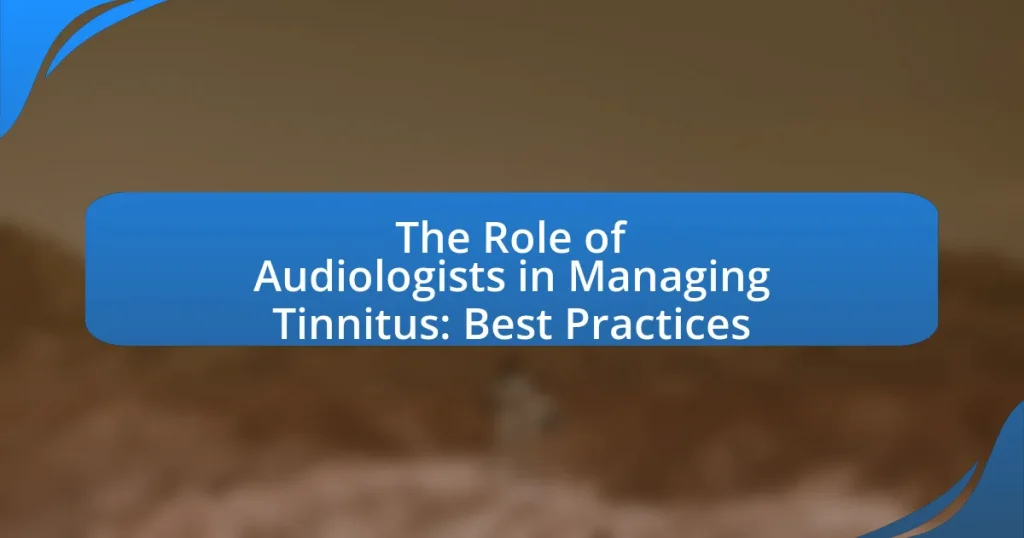Audiologists play a vital role in managing tinnitus, a condition characterized by the perception of sound without an external source. They conduct thorough assessments to identify the underlying causes and severity of tinnitus, utilizing specialized tests and questionnaires. Effective management strategies provided by audiologists include sound therapy, cognitive behavioral therapy, and hearing aids, which have been shown to improve patients’ quality of life. The article outlines best practices for audiologists, emphasizing the importance of a multidisciplinary approach, patient education, and evidence-based treatment options to enhance outcomes for individuals affected by tinnitus.

What is the role of audiologists in managing tinnitus?
Audiologists play a crucial role in managing tinnitus by conducting comprehensive assessments to determine the underlying causes and severity of the condition. They utilize specialized tests, such as audiometric evaluations and tinnitus matching, to gather data that informs treatment options. Evidence shows that audiologists can provide effective management strategies, including sound therapy, counseling, and hearing aids, which have been shown to reduce the perception of tinnitus and improve quality of life for patients. Studies indicate that approximately 80% of individuals with tinnitus benefit from audiological interventions, highlighting the importance of their expertise in this area.
How do audiologists assess tinnitus in patients?
Audiologists assess tinnitus in patients through a combination of patient history, audiometric testing, and specialized questionnaires. They begin by gathering detailed information about the patient’s tinnitus experience, including onset, duration, and perceived severity. This is followed by audiometric evaluations to determine hearing thresholds and identify any associated hearing loss. Additionally, audiologists may use standardized questionnaires, such as the Tinnitus Handicap Inventory, to quantify the impact of tinnitus on the patient’s daily life. These methods provide a comprehensive understanding of the patient’s condition, enabling audiologists to tailor management strategies effectively.
What tools and techniques do audiologists use for tinnitus assessment?
Audiologists use a variety of tools and techniques for tinnitus assessment, including audiometric testing, tinnitus questionnaires, and sound matching. Audiometric testing evaluates hearing thresholds and identifies any hearing loss that may be contributing to tinnitus. Tinnitus questionnaires, such as the Tinnitus Handicap Inventory, assess the impact of tinnitus on a patient’s daily life and help quantify its severity. Sound matching involves the patient identifying a sound that closely resembles their tinnitus, which aids in understanding the characteristics of the tinnitus. These methods are validated by clinical practice and research, demonstrating their effectiveness in accurately assessing tinnitus and guiding treatment options.
How do audiologists differentiate between types of tinnitus?
Audiologists differentiate between types of tinnitus primarily through patient interviews, audiometric testing, and diagnostic assessments. During patient interviews, audiologists gather detailed information about the onset, duration, and characteristics of the tinnitus, which helps classify it as either subjective or objective. Audiometric testing, including pure-tone audiometry and speech audiometry, assesses hearing levels and identifies any associated hearing loss, which is often linked to specific tinnitus types. Additionally, diagnostic assessments such as imaging studies may be utilized to rule out underlying conditions, further aiding in the differentiation of tinnitus types. This systematic approach ensures accurate identification and management of tinnitus, aligning with best practices in audiology.
What treatment options do audiologists provide for tinnitus?
Audiologists provide several treatment options for tinnitus, including sound therapy, cognitive behavioral therapy (CBT), and tinnitus retraining therapy (TRT). Sound therapy involves using external sounds to mask or reduce the perception of tinnitus, which can help patients manage their symptoms. Cognitive behavioral therapy addresses the emotional and psychological aspects of tinnitus, helping individuals develop coping strategies. Tinnitus retraining therapy combines sound therapy with counseling to facilitate habituation to the tinnitus sound. These approaches are supported by clinical evidence indicating their effectiveness in improving the quality of life for individuals with tinnitus.
How do sound therapy and hearing aids help in tinnitus management?
Sound therapy and hearing aids assist in tinnitus management by providing auditory stimulation that can mask or reduce the perception of tinnitus sounds. Sound therapy involves the use of external sounds, such as white noise or nature sounds, to distract the brain from focusing on tinnitus, thereby promoting habituation to the condition. Hearing aids amplify external sounds, making them more prominent than the tinnitus, which can help individuals perceive less of the ringing or buzzing noise. Research indicates that approximately 60% of individuals with tinnitus experience relief through sound therapy and hearing aids, as these tools facilitate a more balanced auditory environment, ultimately improving quality of life for those affected.
What is the role of counseling and cognitive behavioral therapy in tinnitus treatment?
Counseling and cognitive behavioral therapy (CBT) play a crucial role in tinnitus treatment by addressing the psychological and emotional aspects associated with the condition. These therapeutic approaches help patients manage their reactions to tinnitus, reducing anxiety and distress, which can exacerbate the perception of the sound. Research indicates that CBT can lead to significant improvements in tinnitus-related distress and quality of life, as evidenced by a meta-analysis published in the Journal of the American Academy of Audiology, which found that CBT effectively reduces tinnitus severity and improves coping strategies. Thus, integrating counseling and CBT into tinnitus management enhances overall treatment outcomes by fostering resilience and adaptive coping mechanisms in patients.
Why is a multidisciplinary approach important in tinnitus management?
A multidisciplinary approach is important in tinnitus management because it addresses the complex nature of tinnitus, which can involve auditory, psychological, and medical factors. This approach integrates various healthcare professionals, such as audiologists, psychologists, and otolaryngologists, to provide comprehensive care tailored to the individual needs of patients. Research indicates that combining therapies, such as sound therapy, cognitive behavioral therapy, and medical interventions, can lead to improved patient outcomes and reduced tinnitus distress. For instance, a study published in the Journal of the American Academy of Audiology found that patients receiving multidisciplinary care reported greater improvements in quality of life compared to those receiving single-discipline treatment.
How do audiologists collaborate with other healthcare professionals?
Audiologists collaborate with other healthcare professionals by engaging in interdisciplinary teams to provide comprehensive care for patients with hearing and balance disorders, including tinnitus. This collaboration often involves communication with primary care physicians, otolaryngologists, and mental health professionals to ensure a holistic approach to diagnosis and treatment. For instance, audiologists may refer patients to otolaryngologists for medical evaluations or work with psychologists to address the psychological aspects of tinnitus management. Research indicates that such collaborative efforts can enhance patient outcomes by integrating various treatment modalities, thereby addressing both the auditory and psychological components of tinnitus effectively.
What benefits does a team approach offer to tinnitus patients?
A team approach offers tinnitus patients comprehensive care that addresses the multifaceted nature of their condition. This collaborative model integrates various healthcare professionals, such as audiologists, psychologists, and otolaryngologists, ensuring that patients receive tailored interventions that target both the auditory and psychological aspects of tinnitus. Research indicates that multidisciplinary management can lead to improved patient outcomes, including reduced tinnitus severity and enhanced quality of life, as evidenced by a study published in the Journal of the American Academy of Audiology, which found that patients receiving team-based care reported greater satisfaction and symptom relief compared to those receiving standard care.

What best practices should audiologists follow in tinnitus management?
Audiologists should follow a comprehensive approach that includes thorough assessment, patient education, and personalized treatment plans in tinnitus management. A thorough assessment involves using standardized questionnaires and audiometric evaluations to understand the severity and impact of tinnitus on the patient’s life. Patient education is crucial, as it helps individuals understand tinnitus, its potential causes, and management strategies, which can reduce anxiety and improve coping mechanisms. Personalized treatment plans may include sound therapy, cognitive behavioral therapy, or hearing aids, tailored to the specific needs of the patient. Research indicates that a multidisciplinary approach, integrating audiological care with psychological support, enhances treatment outcomes for tinnitus patients.
How can audiologists stay updated on tinnitus research and treatment?
Audiologists can stay updated on tinnitus research and treatment by regularly engaging with professional journals, attending conferences, and participating in continuing education courses. Professional journals such as the Journal of the American Academy of Audiology and the International Journal of Audiology publish peer-reviewed studies and reviews that provide the latest findings in tinnitus management. Conferences like the American Academy of Audiology Annual Conference offer opportunities for audiologists to learn from experts and network with peers. Additionally, organizations such as the American Tinnitus Association provide resources and updates on current research and treatment options, ensuring that audiologists remain informed about advancements in the field.
What resources are available for continuing education in tinnitus management?
Continuing education resources for tinnitus management include online courses, workshops, and professional conferences. Organizations such as the American Academy of Audiology and the American Speech-Language-Hearing Association offer specialized training programs and webinars focused on tinnitus assessment and treatment strategies. Additionally, peer-reviewed journals like the Journal of the American Academy of Audiology publish research and clinical guidelines that serve as valuable educational materials for audiologists. These resources ensure that professionals stay updated on best practices and emerging therapies in tinnitus management.
How can audiologists implement evidence-based practices in their clinics?
Audiologists can implement evidence-based practices in their clinics by integrating current research findings into clinical decision-making processes. This involves regularly reviewing peer-reviewed journals, attending professional development workshops, and utilizing clinical practice guidelines established by organizations such as the American Academy of Audiology. For instance, a study published in the Journal of the American Academy of Audiology emphasizes the importance of using validated assessment tools and treatment protocols for tinnitus management, which enhances patient outcomes and ensures that interventions are grounded in scientific evidence. By adopting these strategies, audiologists can provide high-quality care that is both effective and aligned with the latest advancements in the field.
What role does patient education play in tinnitus management?
Patient education plays a crucial role in tinnitus management by empowering individuals with knowledge about their condition and available treatment options. Educated patients are more likely to engage in self-management strategies, adhere to treatment plans, and reduce anxiety associated with tinnitus. Research indicates that effective patient education can lead to improved coping mechanisms and overall quality of life for those affected by tinnitus, as highlighted in studies such as “The Effect of Education on Tinnitus Management” published in the Journal of Audiology. This study demonstrates that patients who receive comprehensive education report better outcomes and satisfaction with their management strategies.
How can audiologists effectively communicate tinnitus management strategies to patients?
Audiologists can effectively communicate tinnitus management strategies to patients by utilizing clear, empathetic language and providing tailored information based on individual patient needs. This approach ensures that patients understand their condition and the available management options, such as sound therapy, cognitive behavioral therapy, and lifestyle modifications. Research indicates that effective communication enhances patient adherence to treatment plans, as evidenced by a study published in the Journal of the American Academy of Audiology, which found that patients who received personalized education reported higher satisfaction and better management of their tinnitus symptoms.
What materials or resources can audiologists provide to support patient understanding?
Audiologists can provide educational materials such as brochures, pamphlets, and digital resources to support patient understanding of tinnitus. These materials often include information on the causes, symptoms, and management strategies for tinnitus, helping patients to better comprehend their condition. Research indicates that providing clear and accessible information can significantly enhance patient engagement and adherence to treatment plans, as evidenced by studies showing improved patient outcomes when educational resources are utilized.

What challenges do audiologists face in managing tinnitus?
Audiologists face several challenges in managing tinnitus, primarily due to the subjective nature of the condition and the lack of a one-size-fits-all treatment. The variability in patients’ experiences of tinnitus complicates diagnosis and treatment, as each individual’s perception and reaction to the sound can differ significantly. Additionally, the absence of a definitive medical test for tinnitus makes it difficult for audiologists to establish a clear diagnosis, often relying on patient self-reports and questionnaires.
Furthermore, audiologists must navigate the psychological aspects associated with tinnitus, as many patients experience anxiety and depression related to their condition. This necessitates a multidisciplinary approach, often requiring collaboration with mental health professionals to address the emotional impact of tinnitus. Lastly, the limited availability of effective treatment options, such as sound therapy or cognitive behavioral therapy, poses a challenge, as not all patients respond positively to these interventions.
How do audiologists address patient expectations and misconceptions about tinnitus?
Audiologists address patient expectations and misconceptions about tinnitus through comprehensive education and personalized counseling. They provide clear information about the nature of tinnitus, explaining that it is often a symptom rather than a standalone condition, which helps to correct misunderstandings. Research indicates that effective communication can significantly reduce anxiety and improve patient outcomes; for instance, a study published in the Journal of the American Academy of Audiology found that patients who received thorough explanations about their condition reported higher satisfaction levels. Additionally, audiologists utilize evidence-based practices to set realistic expectations regarding treatment options and outcomes, reinforcing the importance of a tailored approach to each individual’s experience with tinnitus.
What strategies can audiologists use to manage difficult patient interactions?
Audiologists can manage difficult patient interactions by employing active listening, demonstrating empathy, and maintaining clear communication. Active listening allows audiologists to fully understand patient concerns, which can de-escalate tension. Demonstrating empathy helps build rapport and trust, making patients feel valued and understood. Clear communication ensures that patients comprehend their diagnosis and treatment options, reducing confusion and frustration. Research indicates that effective communication strategies can significantly improve patient satisfaction and adherence to treatment plans, as highlighted in studies published in the Journal of the American Academy of Audiology.
How can audiologists overcome barriers to effective tinnitus treatment?
Audiologists can overcome barriers to effective tinnitus treatment by implementing a multidisciplinary approach that includes education, counseling, and the use of evidence-based therapies. This approach addresses the psychological and emotional aspects of tinnitus, which are often significant barriers to treatment. Research indicates that cognitive-behavioral therapy (CBT) and sound therapy can significantly reduce the perception of tinnitus and improve quality of life for patients. For instance, a study published in the Journal of the American Academy of Audiology found that patients who received CBT alongside traditional audiological interventions reported greater reductions in tinnitus distress compared to those who received standard care alone. By collaborating with mental health professionals and utilizing comprehensive treatment plans, audiologists can enhance the effectiveness of tinnitus management.
What are the common pitfalls in tinnitus management that audiologists should avoid?
Common pitfalls in tinnitus management that audiologists should avoid include inadequate patient education, failure to individualize treatment plans, and neglecting the psychological aspects of tinnitus. Inadequate patient education can lead to misunderstandings about the condition and its management, which may exacerbate anxiety and frustration. Audiologists must ensure that patients understand tinnitus, its potential causes, and the available management options.
Failure to individualize treatment plans can result in ineffective interventions, as tinnitus experiences vary significantly among individuals. Audiologists should assess each patient’s unique situation and tailor management strategies accordingly.
Neglecting the psychological aspects of tinnitus, such as anxiety and depression, can hinder effective management. Research indicates that cognitive behavioral therapy can be beneficial for patients experiencing distress related to tinnitus, highlighting the importance of addressing mental health in treatment plans. By avoiding these pitfalls, audiologists can enhance the effectiveness of tinnitus management and improve patient outcomes.
How can audiologists ensure they are not over-promising results to patients?
Audiologists can ensure they are not over-promising results to patients by setting realistic expectations based on evidence-based practices and individual patient assessments. This involves conducting thorough evaluations to understand the specific nature and severity of a patient’s tinnitus, which allows audiologists to provide tailored recommendations. Research indicates that clear communication about the limitations of treatment options and the variability of patient responses is crucial; for instance, a study published in the Journal of the American Academy of Audiology highlights that patients often have diverse experiences with tinnitus management, emphasizing the need for personalized care plans. By focusing on patient education and transparent discussions regarding potential outcomes, audiologists can foster trust and avoid unrealistic promises.
What practices can lead to improved patient outcomes in tinnitus management?
Cognitive Behavioral Therapy (CBT) and sound therapy are effective practices that can lead to improved patient outcomes in tinnitus management. CBT helps patients manage the emotional distress associated with tinnitus, reducing anxiety and improving quality of life, as supported by a study published in the Journal of the American Academy of Audiology, which found significant reductions in tinnitus-related distress among participants undergoing CBT. Sound therapy, including the use of hearing aids and white noise machines, can provide relief by masking the tinnitus sounds, which has been shown to enhance auditory processing and reduce the perception of tinnitus, as evidenced by research in the International Journal of Audiology that demonstrated improved patient satisfaction and reduced symptoms with sound therapy interventions.
What practical tips can audiologists implement for effective tinnitus management?
Audiologists can implement several practical tips for effective tinnitus management, including sound therapy, cognitive behavioral therapy (CBT), and patient education. Sound therapy involves using background noise or music to mask tinnitus sounds, which can help reduce the perception of tinnitus. Research indicates that sound therapy can significantly improve the quality of life for individuals with tinnitus (Hawthorne et al., 2019, Journal of the American Academy of Audiology).
Cognitive behavioral therapy (CBT) is another effective approach, as it helps patients change their emotional response to tinnitus, reducing distress and improving coping strategies. Studies show that CBT can lead to a significant reduction in tinnitus-related distress (Hesser et al., 2011, Journal of Clinical Psychology).
Additionally, educating patients about tinnitus, its causes, and management strategies empowers them to take an active role in their treatment. Providing resources and support can enhance patient engagement and adherence to management plans.


